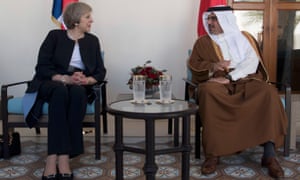My husband, Mohammed Ramadan, faces the death penalty for a crime he did not commit. I urge the prime minister, on her visit to my country, to step in
My husband, Mohammed Ramadan, is due to be executed in Bahrain any day now. Our three young children are distraught. We want Theresa May, the British prime minister, to call for Mohammed to be released when she meets Bahraini leaders today on her Gulf visit. Our criminal justice system has failed him and the British government, which supports that system, has failed him too.
In 2014 Mohammed was arrested at Bahrain’s airport where he worked as a police officer. My husband believes in human rights, democracy and transparency. He attended peaceful marches in Bahrain calling for our government to respect these values. As a state employee, he knew that it was risky for him to go to these protests. But he believes in reform and so he went anyway.
After Mohammed was taken into custody, our family heard nothing for four days – we had no idea where he was, or even if he was alive. Eventually, two weeks later, we were allowed to see him, but only with three guards watching us on a surveillance camera. As soon as we saw him, it was clear that Mohammed had been tortured by the security services.
Mohammed seemed weak and exhausted, and his body was trembling; this suggested to us that he had been subjected to extreme torture. But no one would tell us the reasons for his arrest or the charges against him.

Later, he told us what they had done to him. They had detained him, naked and humiliated, in a freezing cold cell. They had beaten him. They had forced him to stand for days on end. They had electrocuted him. They had sexually assaulted him. They had made him listen to the screams of other prisoners being tortured. They had threatened to rape me and other members of our family in front of him.
Their aim was to punish Mohammed for his participation in the pro-democracy protests by getting him to confess to a crime he did not commit. Eventually, Mohammed and his co-defendants signed false “confessions” to make the torture stop. Mohammed was not allowed to see or speak to his lawyer until after his trial had started. He was convicted on the basis of his forced confession, even though he had recanted it. This “evidence” – which would immediately be thrown out of any court in Britain – is the reason that my beloved husband and the father of my children is facing imminent execution.
Shortly after my husband’s arrest, I submitted a complaint about his mistreatment to my country’s UK-trained ombudsman, who is meant to investigate such allegations. An international human rights organisation submitted a torture complaint, too. But the ombudsman conducted no investigation for more than two years, even as Mohammed was sentenced to death.
Then this year, following intense pressure on the UK Foreign Office by human rights groups such as Reprieve and the Bahrain Institute for Rights and Democracy, the ombudsman agreed to open a new investigation. I’ve been told that this investigation is now closed, but I know very little about its outcome. Furthermore, the Foreign Office has not yet called for his release.
Sadly, my husband is not alone. In the past two years judges have handed down eight death sentences, including my husband’s. Many of these people have been convicted on the basis of confessions extracted through torture. The Bahrain government regularly strips its political opponents of their citizenship and sentences peaceful human rights activists to decades in prison.
Throughout this time, the UK government has championed Bahrain’s supposed human rights reforms, spending millions coaching a torture watchdog, training hundreds of guards at the death-row jail where he is held, and secretly assisting Bahrain’s police, who continue to torture peaceful protesters.
The only result of all of this that I have seen is that my husband remains in prison, facing execution for a crime he didn’t commit – while the people who tortured him still walk free.


